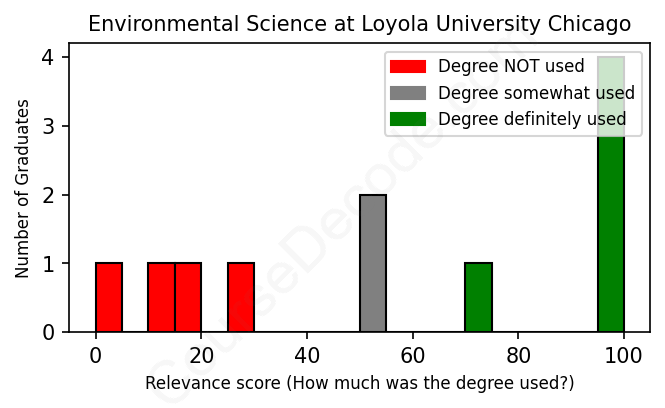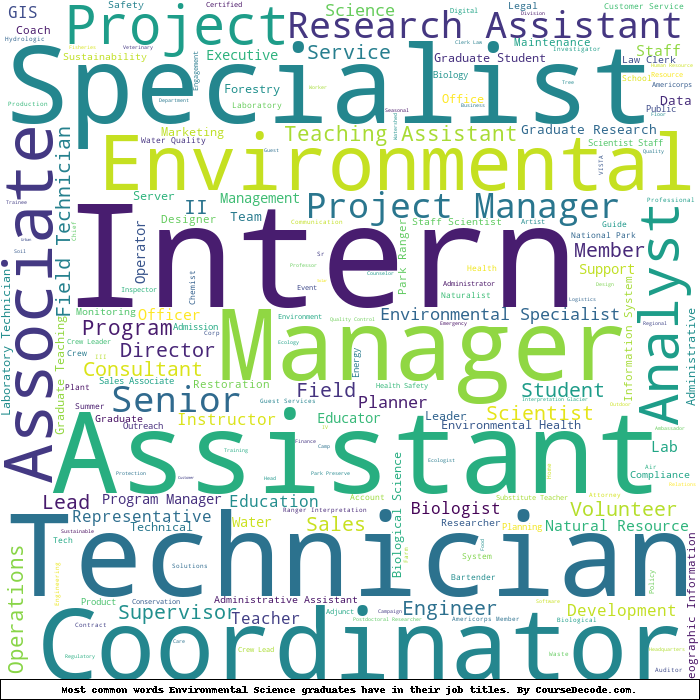
First, some facts. Of the Environmental Science graduates from Loyola University Chicago we've analyzed , here's how many have used (or NOT used) their degree in their career:

These are estimates based on AI analysis of 11 LinkedIn profiles (see below).
The verdict? Significantly below average. Overall, with an average relevance score of 56%, Environmental Science graduates from Loyola University Chicago have a much lower likelihood (-11%) of finding work in this field compared to the average graduate across all fields:
And for comparison, here's the chart for all profiles we've looked at across all degrees.
Also, after graduating, 45% of these graduates have pursued further education other than another Bachelor's degree (such as a Masters degree or other), compared to the average across all profiles of 35%. This suggests you may need more than just a Bachelors degree to be competitive as a Environmental Science graduate.
See the details:
|
Relevance score: 17% We think this person has NOT gone into a career related to their degree. We think this person has NOT gone into a career related to their degree.
DEGREE INFOGraduated in 2019 from Loyola University Chicago with a Bachelor of Science - BS in Environmental Science. No other secondary education since. JOB HISTORY SINCE GRADUATIONChief Executive Officer Pete's Botique LLC Jan 2019 - Dec 2020 Chief Executive Officer  Not Really LLC Jan 2020 - Present Chief Executive Officer  Novo Lifecycle Products Jan 2021 - Present ABOUTLeveraging a strong foundation in environmental science from Loyola University Chicago, my role as CEO has been marked by decisive leadership and a commitment to strategic building. With over three years at the helm of my current organization, we've tackled complex challenges through innovative problem-solving and strategic decision-making. Our successes are anchored in a shared vision for sustainable growth and innovation, guided by the competencies that have become the cornerstones of our leadership ethos. |
The top 10 most common jobs done by the graduates we've analyzed (ranked most common to least) are:
When looking at the careers of graduates from Loyola University Chicago with a degree in Environmental Science, it’s interesting to see the variety of paths they've taken. A lot of those who graduated around 2010 seem to have drifted towards healthcare roles, particularly as registered nurses. While these jobs are valuable and necessary, they really don’t relate to the environmental science field—most folks in those positions are focused on patient care rather than environmental issues. On the other hand, graduates from more recent years have pursued jobs that are much more aligned with environmental science. Roles like Environmental Scientist or Graduate Fellow at environmental organizations clearly make use of the education they received and connect back to their studies.
Overall, it looks like the trend is shifting toward jobs that actually involve environmental science, especially for recent graduates. Many of them have taken on roles like research assistants or environmental policy interns where they can apply their knowledge directly. Others are getting involved in sustainability initiatives or environmental advocacy, which shows a clear connection to their degree. It’s kind of a mixed bag, but generally, the more recent grads seem to be leaning into careers that value their environmental science background, while some earlier graduates have found themselves in roles that, while important, don’t really tie back into that academic focus.
Here is a visual representation of the most common words in job titles for Environmental Science graduates (this is across all Environmental Science graduates we've analyzed, not just those who went to Loyola University Chicago):

When looking at the career paths of graduates who studied Environmental Science at Loyola University Chicago, a mix of outcomes emerges. For many, their first jobs are quite relevant to their field, often starting off in positions that provide on-the-ground experience in environmental sustainability or education, like internships and research roles. For example, recent graduates took positions as interns at environmental organizations or research assistants, which is a solid way to kick off a career in this sector. However, there are also notable exceptions where individuals have veered away from traditional environmental roles, taking on positions in other fields, such as nursing, IT support, or even starting their own businesses that may not have a direct connection to environmental science.
As for what these graduates are doing five to ten years down the line, it's a bit of a mixed bag. Some have progressed into more advanced roles within environmental consulting or non-profit sectors, like the person working as a Senior Consultant or Managing Consultant at Opinion Dynamics, where they tackle issues of sustainability and equity. Others have found themselves in unrelated fields, such as project management in various industries or even healthcare roles. This suggests that while the starting point for many Environmental Science graduates aligns well with environmental careers, the ongoing career trajectories can diverge significantly, with some individuals finding good opportunities in their field while others may end up in completely different directions. Overall, it seems there's potential for success, but not everyone sticks to a path that’s closely tied to their degree.
Honestly, a Bachelor’s degree in Environmental Science can be a bit challenging, but it definitely has its manageable moments! At Loyola University Chicago, you're likely to dive into a mix of science courses—like biology, chemistry, and geology—alongside some policy and ethics topics. It’s not just about hitting the books, though; you’ll probably do some fieldwork, which can be pretty cool and hands-on. If you’re into tackling real-world problems and enjoy working on projects, that can make things easier and more engaging. Overall, it’s not the easiest degree out there, but if you're passionate about environmental issues and ready to put in the effort, it can be a rewarding experience!
Most commonly, in the LinkedIn profiles we've looked at, it takes people 4 years to finish a Bachelor degree in Environmental Science.
Looking at the job histories of these Environmental Science graduates from Loyola University Chicago, it seems like their earnings might be a bit all over the place. Those who became nurses or landed solid consulting roles at places like Opinion Dynamics likely pulled in decent salaries, especially the nurse who worked with Aya Healthcare, a travel nursing agency known to pay well. On the other hand, some of the more entry-level roles, like internships or positions at non-profits, probably didn’t pay as well, which is pretty typical in the environmental sector. Graduates from more recent years have primarily taken on internships or support roles, suggesting they might still be working their way up the ladder. Overall, it seems like while some individuals have found good-paying jobs, others might still be in the earning range of entry-level positions, which isn’t always great.
Here is a visual representation of the most common words seen in the "about" section of LinkedIn profiles who have a Bachelor degree in Environmental Science (this is across all Environmental Science graduates we've analyzed, not just those who went to Loyola University Chicago). This may or may not be useful:

Here are all colleges offering a Bachelor degree in Environmental Science (ordered by the average relevance score of their Environmental Science graduates, best to worst) where we have analyzed at least 10 of their graduates:
| College | Score | Count |
|---|---|---|
 University of North Carolina at Chapel Hill University of North Carolina at Chapel Hill
|
87 | 10 |
 The Ohio State University The Ohio State University
|
85 | 12 |
 University of Vermont University of Vermont
|
68 | 13 |
 University of Oregon University of Oregon
|
66 | 10 |
 Western Washington University Western Washington University
|
63 | 14 |
 University of Virginia University of Virginia
|
57 | 15 |
 Oregon State University Oregon State University
|
56 | 11 |
 Loyola University Chicago Loyola University Chicago
|
56 | 11 |
 Southern New Hampshire University Southern New Hampshire University
|
53 | 15 |
 University of Phoenix University of Phoenix
|
46 | 15 |
 Florida State University Florida State University
|
45 | 16 |